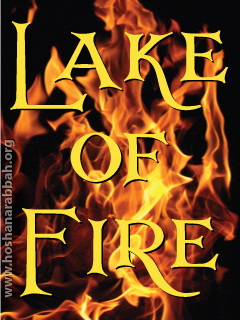
In these last days, the enemies of Elohim are crawling out of their caves and lairs, and from under the rocks where they have been hiding. This is because Satan knowns that his time as the god of this age is short, and he is pulling out all of the proverbial stops to make his last stand against the saints of the Mose High, and ultimately against the soon-coming Conquering King Yeshua our Messiah.
Until then, Satan has commissioned and empowered the biblically prophesied spirit of Antichrist to rise up against the saints all across the globe. All of this is against the backdrop of and partially empowered by the weakness of a lukewarm, apostate, largely money-driven corporate Christian church to stand against these evil forces.
The year 2020 has been especially a hot year in regard to the rising up of satanic forces. Satan is the author of confusion, fear and is out to kill, steal and destroy. This is occurring globally through the disease “pandemics” manipulated to bring earth’s population under the physical and psychological control of globalist tyrannical government as well as the modern sorcerers of the drug cartels, who make billions peddling their pharamaceia, while enslaving their drug-addicted cliental (Rev 9:21 and 18:23).
In the U.S., for example, there has been an unprecedented uprising of leftist, Marxists and anarchist criminal elements and the failure of supportive acquiescing morally weak and left-leaning political leaders to apply the rule of law against them. Moreover, we have witnessed the likely manifestation of a fraudulent presidential election that has given rise to leftist and criminal elements taking the reins of control over this nation. Through it all, the lives and businesses of millions are being ravaged and destroyed as the leftist leaders impose onerous restrictions and soft-martial law, civil liberty edicts in many areas across the country. Fear, uncertainty and hopelessness reigns as food lines, even in prosperous areas, lengthen, jobless rates soar and one-third of Americans, for example, are in danger of losing their homes unable to pay their mortgages and rent due to job loss.
Where do we go from here? Thousands of years ago, the Bible prophesied that these things would occur in the last days. Why should those who are awake, alert and or the Son’s of the Light who do not exist in spiritual darkness be surprised? Many of us have seen these days coming for a long time and have prepared ourselves physically, mentally, emotionally and spiritually for them. Beyond that, our trust is in YHVH Elohim the promises of his Word to protect and provide for his saints. Trials and persecutions will occur. Some will even be martyred (a spiritual promotion). In the mean time, we stand against evil in the name and power of the resurrected Messiah, occupying until he comes, while being about our Father’s business of helping to spread the good news of the kingdom of heaven.
In conclusion, please keep this one thing in mind: The best and safest place to be in both good and bad times is in the center of YHVH’s perfect will for your life. Find it and rest in it trusting in YHVH to lead, lead and protect you as he is forming and shaping each of us into the perfect image of Yeshua!
And we know that all things work together for good to those who love God, to those who are the called according to His purpose. For whom He foreknew, He also predestined to be conformed to the image of His Son, that He might be the firstborn among many brethren. (Rom 8:28–29)
Are the Imprecatory Psalms at Odds With Yeshua’s Command to Love One’s Enemies?

Psalm 58 like many of the other imprecatory (from imprecation meaning “a spoken curse”) psalms expresses the extreme and overwhelming frustration, nay, the animus or antipathy that the righteous child of Elohim often viscerally feels toward the wicked evildoers that surround him, and the strong and yearning desire that one has for heaven to render judgment against those who hate all that is good. Is it a bad thing for righteous people to hate wickedness? Is it sinful for YHVH’s saints to desire justice from the heavenly courts for the wrongs committed against them by their wicked, evil-doing and God-hating enemies? More importantly, are the imprecatory psalms opposed to Yeshua’s teaching to love one’s enemy? While this may appear to be the case, and many Christian Bible teaches aver this to be so, we will answer these questions, and upon closer examination, see that these imprecatory psalms express some deeper spiritual truths that are consistent with the totality of Scripture and are actually in line with the teachings of Yeshua. In analyzing this subject, we will use Psalm 58 as our launch pad into examining a larger subject suggested by the imprecatory verbiage found in biblical psalmic literature.
At the outset of this discussion, let’s establish one important fact. The author of the fifty-eighth psalm knows a basic Bible truth that is found in both the Old and New Testaments. It is that judgment against one’s enemies is ultimately in the hands of Elohim (Deut 32:35, 43; Ps 94:1–2; Rom 12:19; Heb 10:30); it is the Almighty who will arise and tread down and scatter one’s enemies (Ps 60:12; 68:1). In the mean time, however, while waiting for Elohim to act, the earth reels and struggles under the heavy and constant attacks of the wicked, and the psalmist cries out to Elohim to render judgment against the ungodly (Ps 58:6), which Elohim will eventually do. At that time, the righteous will rejoice (Ps 58:10). The time when heaven will balance the scales of justice cannot come soon enough for the oft persecuted and downtrodden saints, for it will be then when YHVH will reward the righteous and judge the wicked when he comes from on high (Ps 58:11).
At that time when the scales of justice are finally balanced, the righteous will awaken at the resurrection to everlasting life and will shine like the stars, while the wicked will be condemned to everlasting shame and contempt (Dan 12:2–3 cp. Matt 13:43).
In the mean time, the saintly psalmist realizes that vengeance against his enemies is ultimately in the hands of the Almighty Judge of the universe (Ps 94:1–2), for vengeance against evil-doers belongs solely to Elohim (Deut 32:35, 43; Nah 1:12; Rom 12:9; 13:4; Heb 10:30). He also knows that only YHVH Sabaoth (the LORD of Hosts) will, in his perfect timing, fight for, defend, protect and deliver his people from the clenched claws and vampiric fangs of all Elohim-hating evil-doers. Therefore in nearly all of the imprecatory psalms, we see the poet-songwriter not actually cursing his enemies, but rather, he is appealing to the courts of heaven to render justice against his enemies on his behalf (e.g. Pss 35; 40:13–15; 55; 58; 68:1–3, etc.). There is an ocean of difference between cursing one’s enemies and beseeching the just, holy and righteous Lawgiver and Judge of the universe to right the wrongs done against him by evildoers. The psalmist knows that his fate is in YHVH’s hands, and he trusts in his Creator to take care of him.
Sadly, some New Testament oriented Bible teachers decry the psalmists’ numerous imprecations against their enemies. These same teachers criticize the psalm writers for ostensibly not loving their enemies as Yeshua taught and declare that such a mental demeanor toward one’s enemies was an element of the“old covenant,” and that now as “new covenant” believers we are under a higher and better standard of conduct than that of the Old Testament saints. Such unbiblical teachings are perennially taught in churches across the world, even though the Tanakh or Hebrew Scripture, like the New Testament, enjoins the people of Elohim to love their neighbor (no distinction is made between a neighbor who is a friend or an enemy) as themselves (Lev 19:18). Moreover, the ten commandments of Exodus 20 forbid murder, adultery, stealing, lying and coveting, which, according to Paul, is the definition of loving one’s neighbor, and is the fulfilling of the Torah-law (Rom 13:8–10). In his discussion, Paul makes no distinction between friend or foe: everyone is to be loved.
While criticizing the saints of ancient Israel for supposedly cursing their enemies, these self-proclaimed grace-oriented “New Testament Christians” will also go on to decry “the old (Torah-) law of Moses” that, in their minds, gave rise to the psalmists’ imprecations against their enemies. These Bible teachers sometimes go so far as to declare that Christians are no longer under that “terrible old law” which brought judgment and vengeance on people, but are haply now “under the law of Christ,” and “the law of love and grace.” Sadly, these misguided Bible teachers are ignorant, willingly or otherwise, of several fundamental biblical truths.

- First, YHVH’s standards of righteousness (called the Torah-law or “law of Moses”) have never changed from the beginning of time until now.
- Second, Yeshua the Messiah is the Word of Elohim that was made flesh and that Word including the Torah-law has never changed.
- Third, Yeshua the Messiah was, in fact, the “God” of the Old Testament, who in his pre-incarnate state gave the same Torah-law to Moses and the Israelites. It is very same law that many Christians sadly, repeating the unbiblical traditions of men by which the Word of Elohim is made of none-effect, declare was against us and was “done away with.”
- Fourth, the Bible, and Yeshua himself, testify that the Torah-law and the law of Christ or the Messiah are synonymous terms. There is no antithetical dichotomy between them contrary to popular opinion. Again, YHVH’s standards of righteous have never changed form Genesis to Revelation.
- Fifth, the end time saints are those who not only have the testimony of Yeshua but who also keep the commandments of Elohim (Rev 12:17; 14:12).
- Sixth, the saints will receive rewards in the kingdom of Elohim based on their good of Torah-obedience (Matt 5:19).
- Seventh, the apostolic disciples of Yeshua including Paul were all Torah-obedient.
- Eighth, Paul declared that he himself was “under the law toward Christ” (1 Cor 9:21).
- Ninth, it is a historical fact that the idea that the Torah law of the Old Testament was done away with did not come into the Christian church until the middle part of the second century A.D.—long after the death of the last apostle. Moreover, this antipathy in for the “Old Testament” or the so-called “Jewish law” did not take full hold in what would become mainstream Christianity until several hundred years after the death of the apostles of the first century. These facts are well recorded in the writings of the Ante-Nicene church fathers for those who care to examine the facts.
- Tenth, Elohim hates sin and he hates unrepentant evil doers (Pss 5:5; 11:5; Prov 6:16–19). Moreover, the people of Elohim are to hate the things that Elohim hates (Ps 139:20–22), and, by logical extension, to love the things that he loves. A cursory analysis of the imprecatory psalms reveals that this is, in fact, the heart attitude of the psalm writers. Moreover, the psalmists are continually relying on YHVH Elohim to be the one to bring judgment against his and their enemies; they realize that justice is in the hands of heaven, not in their hands.

What’s more, the Bible reveals that eventually, YHVH will judge the wicked and unrepentant sinners and condemn them to the lake of fire where they will be destroyed forever. The hard truth of this message may not play well in the modern easy-believism, seeker sensitive, lukewarm and largely apostate Christian churches, but truth is truth whether popular or not. It is this eventual fate of the wicked evil-doers, who are the enemies of the saints of Elohim, that the psalmists have in view when declaring their imprecations against their enemies. We see this fact clearly evidenced in Psalm 58, for example, where the psalmist is appealing to the just, holy and righteous Judge of the universe to render his ultimate legal decision against those who hate the laws of Elohim. If we have a problem with this timeless truth, then we have a problem with the Bible, the Word of Elohim and its Author. Period and end of discussion.
Finally, now to our main point. When the David, the psalmists, decries his enemies in the numerous imprecatory psalms, it is important to keep several things in mind. The Bible declares that David, the main biblical psalmic writer, was a man after Elohim’s own heart, so who are we to criticize his motives for penning the imprecatory psalms? Moreover, who are we to criticize the Spirit of Elohim-inspired or God-breathed Scriptures that penned these Bible passages through human instruments? What kind of a spiritual pedestal are we placing ourselves on when we do such a thing? Do we arrogantly deign to think that we know better than Elohim or those human instruments he chose to work through when writing the Bible? No! May it never be. To be sure, to question Scripture and its Author is a paradigmatic trap of human self-serving arrogance into which many Christian Bible teachers have fallen. It is from this false truth platform that they proffer their man-made teachings that have made of none effect the Word of Elohim.
Is hatred for one’s enemies a bad thing? Not necessarily. After all, there is a thing that Scripture refers to as a “perfect hatred” (Ps 139:22). But a hatred for whom? In Psalm 139, the author declares that he himself hates YHVH’s enemies (vv. 20–22). If the saint is to hate anyone, then they must make certain that they are only hating Elohim’s enemies with a godly hatred. Since such a hatred seems to be a tiny needle’s eye to thread for most of us, and for fear of hating the wrong people in a sinful way, it is best, therefore to love one’s enemies (as Yeshua teaches in the Matt 5:38–48), while hating their sin.
Yes, to be sure, it is preferable to remain mindful of Yeshua’s instruction to bless and to pray for one’s enemies and to do good to them (Matt 5:38–48). Why? Will it make a difference in how one’s enemies act or treat you? Likely not. However, the blessed fruit of loving one’s enemies is that the power of their angry hatred against us will fail to take hold in our own hearts lest we become like them, so that we too are consumed with anger, bitterness and spitefulness. By allowing the retributive works of the flesh to gain a psycho-emotional stronghold in us, such negative attitudes end up destroying one’s physical and spiritual health from the inside out. Moreover, such a mind and heart orientation actually ends up poisoning one’s positive outlook resulting in stress and fear, which are emotional, psychological and spiritual killers. Love and forgiveness, even for one’s enemies, on the other hand, are powerful antidotes to the infectious and rotting disease of hatred. In the mean time, the saint would be wise to follow the admonition of Paul, “Do not be overcome by evil, but overcome evil with good” (Rom 12:21).
What we hopefully can conclude from this brief discussion is that the imprecatory psalms are not inconsistent with the teachings of Yeshua. Moreover, let us not forget that while Yeshua at his first coming may not have come with a sword to render judgment on his enemies, but as a lamb ready to lay his life down for his people, this will hardly be the case at this second coming. At that time, Yeshua will return as a conquering warrior-king on a war stallion carrying a sword with which he will smite his enemies. This is doubtless the view that the authors of the imprecatory psalms hand in mind when beseeching Elohim to avenge them of their enemies.



Nathan. This is a excellent commentary on this subject. It is difficult to broach the subject of hate in the bible and that it can be attributed to YHVH,’s servants. Some Truths are hard to acknowledge, but as you said, Truth is Truth!
As to your opening paragraphs, it seems to me the horses of Revelation are under way. The “corona” virus could well be connected to the white horse. The red horse of war, like civil war, etc. may be getting ready soon. Here in the USA with this selection, not election, could cause fighting to break out soon. Now we hear of famine being projected in the coming year.
On a side note, the conjunction of Saturn and Jupiter on Dec. 21, solstice, could be a harbinger. We will see. Lots going on now.
With regard to your thoughts about the four horsemen, I don’t know. I am watching and praying and keeping my mind open until revelation is given.
Where did you learn of these coming conjunctions? And since Saturn in Hebrew is Shabtai( same root as Sabbath) and Jupiter is Tze’dek=justice, what do you make of this?
Hi Carol. Various news sites. Some are wrongly referring to this as the Bethlehem star. Clearly this had nothing to do with the birth of the Messiah, but perhaps a different birthing will take place. I know the Romans named Saturn and Jupiter after their gods. It seems Jupiter is known as Baals planet and Saturn has a reference to rest as you said. These are also referred to as wandering stars. We will see!
Amen! We wrestle not against flesh and blood and there is no room for sympathy toward our spiritual enemies.
Torah is Love. Keep the 10 Commandments, love Elohim and love neighbour and you have loved your enemy.
Shalom, John
Luke 10:30-37=the good Samaritan! You reminded me of this because when they asked Yeshua “who is my neighbor” and He relates this story, the Samaritans were dogs to the Jews and yet it is the Samaritan who is the good one (like a good neighbor!) You said love your neighbor and you have loved your enemy! (by the way so glad you’re better!)
It’s really that simple isn’t it?! Why do people make the Word of Elohim so complicated? (a rhetorical question)
Could it be because we’ve been taught linear (Greek) thinking instead of cyclical (Hebrew) thinking-if you draw a line thru a circle it means no or nothing!
We must be wise as serpents, harmless as doves.
Carol, that is an interesting thought. Hellenism has had a major effect on our world. Reminds me of Antiochus Epiphanies. Even the New Testament was written in Greek. At least the versions we have today. That makes parts of the New Testament confusing for some, especially some of Yeshua’s statements.
Steve, thanks for your replies. What we call the New Testament was not written in Greek originally (here’s a clue “to the Jew first and then to the Greek” Romans 1:16 so it makes sense it was written first in Hebrew and this is what has been discovered in this decade) Hebrew gospels that were discovered in Cochin, India and Catalan, Spain! Some were even carried around by the Waldensians (Valdes, NC!) It’s a fascinating study! You can check it out thru Dr. Miles Jones or Nehemia Gordon 🙂
Thanks! I will check out Dr. Jones.
Cover their faces with shame, Lord,
so that they will seek your name.
17 May they ever be ashamed and dismayed;
may they perish in disgrace.
18 Let them know that you, whose name is the Lord—
that you alone are the Most High over all the earth.
Notice in these verses that the reason for judging God’s enemies is so that they would seek him and know that He is the Lord Most High so wrapped up in His judgements is love. Even in Revelation 9:20 and 21 you can see that God in sending the plagues was wanting them to come to repentance.
Amen, Amen, Praise forever to Him who sit on the throne !